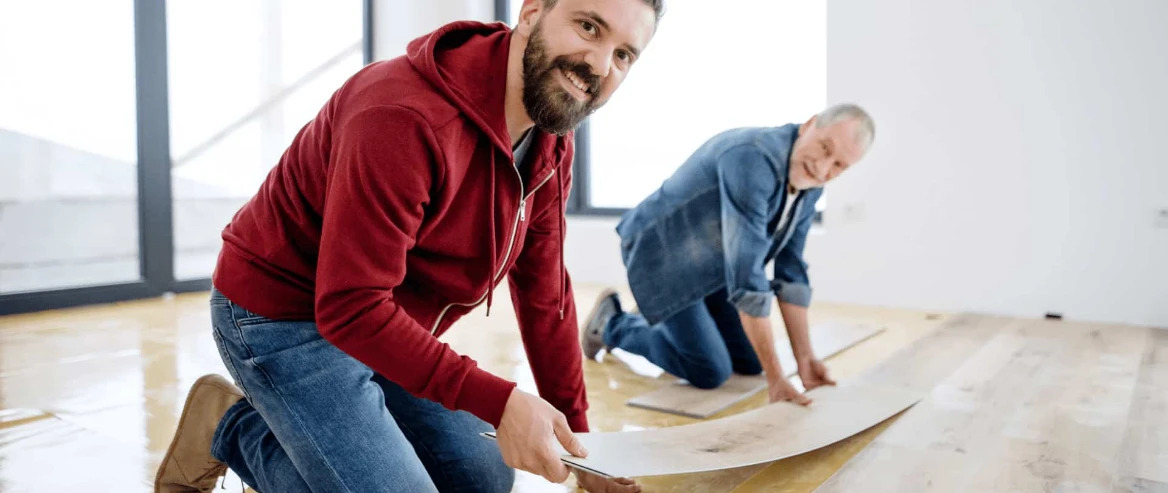5 Vital Facts About Vinyl Flooring
Published on Sep 21, 2020

Vinyl flooring is not what it used to be.
For many of us, the term vinyl flooring conjures images of often heavily patterned floors circa 1970s (with matching benchtops in some homes). However, vinyl flooring these days is a resilient and stylish alternative to timber or tiled floors.
What are the different vinyl flooring options?
Before we delve into vinyl flooring in more detail, Carpet One has some handy information to distinguish between the different types of vinyl flooring available.
1. Vinyl plank

Vinyl planks are 100% waterproof and can be sealed to stop moisture seeping through the floor. They are available in a variety of textures and colours to imitate different wood species. Vinyl planks are also highly stain-resistant and much easier to maintain than hardwood floors.
2. Vinyl sheet

Vinyl sheeting is one of the more durable and affordable flooring options available. It generally comes in a single roll between 6 to 12 feet wide.
Advances in print technology have improved the visual quality of vinyl sheet and you can easily recreate the look of stone, hardwood or tile.
Vinyl sheet can be installed over concrete, tile, wood, old vinyl or underlayment.
3. Vinyl tiles

This flooring comes in individual squares which mimic the look of stone tiles. It is relatively easy to replace a tile if one is damaged.
Installation is much easier than traditional tiles, utilising a peel and stick method. You can even use grout between the tiles to make it look even more realistic.
4. Luxury vinyl tiles

This stylish option can create the same visual effect as natural stone or hardwood planks. LVT can also deliver prestige looks like marble for a fraction of the cost.
It is softer and warmer under foot than your traditional options, offering a genuine look at an affordable price.
Regardless of what you choose, a robust wear layer is important for ultimate durability. Although there are different types of layers, a urethane-based wear layer offers the best protection against scuffs and stains as well as resistance to household chemicals.
What are the advantagers of vinyl flooring?

1. They're perfect for family homes
With a range of colours available to complement your decor, vinyl flooring is an aesthetically pleasing option. It’s practical, too.
It can withstand heavy traffic but is comfortable and quiet, reducing noise within your home. Best of all, vinyl flooring is popular in areas such as kitchens and bathrooms because it is totally resistant to water and spills, including pet messes! Sounds like a winner to us.
2. They're an affordable choice
Like anything, pricing can vary depending on the area being laid, the design chosen and any difficulties your installer may encounter.
Many people choose to DIY, which is fine for uncomplicated spaces. We recommend an installer for most jobs however, given how quickly a professional can get a job done and tackle any issues. Installation costs are relatively inexpensive, usually between $26-$35 per sqm. You will be required to research this further for yourself, however.
It is up to you how much money you want to spend on the flooring itself. As a rough guide, Carpet Court offers an affordable vinyl flooring option at $581 for a medium (3.5m x 4.5m) sized room, installation and subfloor costs not included.
3. Vinyl flooring is easy to maintain
There are a couple of things to be aware of when laying vinyl that will give it the best chance of looking great for years to come.
-
A plywood layer is recommended before laying a vinyl floor, as concrete or existing flooring can affect the smoothness of the vinyl.
-
Research recommends waiting at least three days after installation before cleaning your vinyl floor for the first time – your installer will advise.
A benefit is that they won’t need re-grouting like tiles or resealing like timber floors, making them economical and low maintenance.
Like timber and tiles, it is important to look after your floors to maintain their appearance. Luckily, vinyl floors are extremely durable so it isn’t too complicated.
For ongoing maintenance, sweep and mop once a week with a cleaning product safe for vinyl floors, and clean spills quickly.
4. They can be professionally cleaned
Did you know that Electrodry will professionally clean vinyl floors? Our technicians have developed a refinishing process that provides a deep clean and minimises any scuff marks on the floor. Our water-based coating will bring back your floor’s shine, which can be dulled by cleaning products and general wear. Contact us to find out more.
5 Disadvantages of Vinyl Flooring
It’s not all sunshine and rainbows; there are a few cons to vinyl flooring you should be across.
-
Vinyl floors may be dented by very heavy furniture or punctured by sharp objects being dropped on the floor.
-
Colours may fade if exposed to direct sunlight for a prolonged period.
-
Vinyl flooring isn’t usually recycled, so worn-out materials take up space in landfills.
-
Vinyl isn’t a biodegradable material.
-
Chemicals used in the manufacture of vinyl flooring can cause a toxic out-gassing to occur after the floor is installed.




